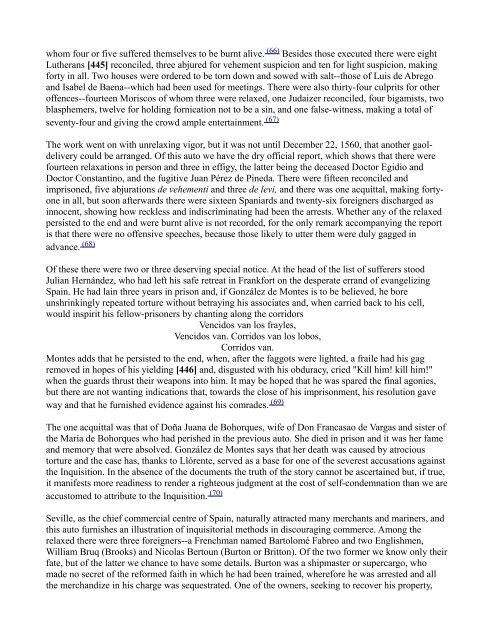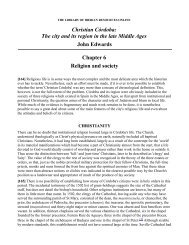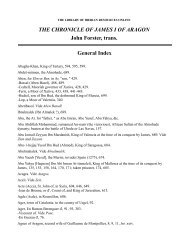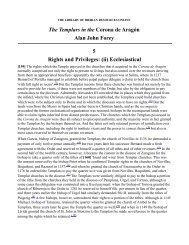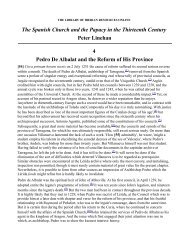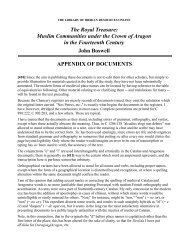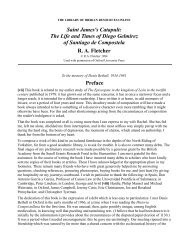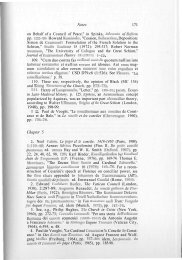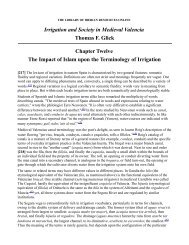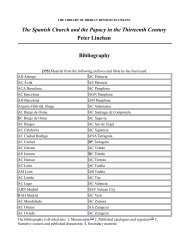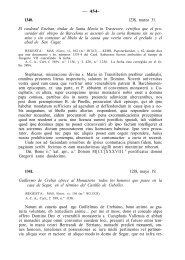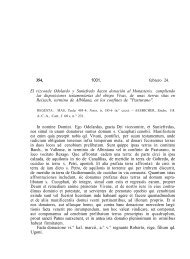PROTESTANTISM - The Library of Iberian Resources Online
PROTESTANTISM - The Library of Iberian Resources Online
PROTESTANTISM - The Library of Iberian Resources Online
Create successful ePaper yourself
Turn your PDF publications into a flip-book with our unique Google optimized e-Paper software.
whom four or five suffered themselves to be burnt alive. (66) Besides those executed there were eight<br />
Lutherans [445] reconciled, three abjured for vehement suspicion and ten for light suspicion, making<br />
forty in all. Two houses were ordered to be torn down and sowed with salt--those <strong>of</strong> Luis de Abrego<br />
and Isabel de Baena--which had been used for meetings. <strong>The</strong>re were also thirty-four culprits for other<br />
<strong>of</strong>fences--fourteen Moriscos <strong>of</strong> whom three were relaxed, one Judaizer reconciled, four bigamists, two<br />
blasphemers, twelve for holding fornication not to be a sin, and one false-witness, making a total <strong>of</strong><br />
seventy-four and giving the crowd ample entertainment. (67)<br />
<strong>The</strong> work went on with unrelaxing vigor, but it was not until December 22, 1560, that another gaoldelivery<br />
could be arranged. Of this auto we have the dry <strong>of</strong>ficial report, which shows that there were<br />
fourteen relaxations in person and three in effigy, the latter being the deceased Doctor Egidio and<br />
Doctor Constantino, and the fugitive Juan Pérez de Pineda. <strong>The</strong>re were fifteen reconciled and<br />
imprisoned, five abjurations de vehementi and three de levi, and there was one acquittal, making fortyone<br />
in all, but soon afterwards there were sixteen Spaniards and twenty-six foreigners discharged as<br />
innocent, showing how reckless and indiscriminating had been the arrests. Whether any <strong>of</strong> the relaxed<br />
persisted to the end and were burnt alive is not recorded, for the only remark accompanying the report<br />
is that there were no <strong>of</strong>fensive speeches, because those likely to utter them were duly gagged in<br />
advance. (68)<br />
Of these there were two or three deserving special notice. At the head <strong>of</strong> the list <strong>of</strong> sufferers stood<br />
Julian Hernández, who had left his safe retreat in Frankfort on the desperate errand <strong>of</strong> evangelizing<br />
Spain. He had lain three years in prison and, if González de Montes is to be believed, he bore<br />
unshrinkingly repeated torture without betraying his associates and, when carried back to his cell,<br />
would inspirit his fellow-prisoners by chanting along the corridors<br />
Vencidos van los frayles,<br />
Vencidos van. Corridos van los lobos,<br />
Corridos van.<br />
Montes adds that he persisted to the end, when, after the faggots were lighted, a fraile had his gag<br />
removed in hopes <strong>of</strong> his yielding [446] and, disgusted with his obduracy, cried "Kill him! kill him!"<br />
when the guards thrust their weapons into him. It may be hoped that he was spared the final agonies,<br />
but there are not wanting indications that, towards the close <strong>of</strong> his imprisonment, his resolution gave<br />
way and that he furnished evidence against his comrades. (69)<br />
<strong>The</strong> one acquittal was that <strong>of</strong> Doña Juana de Bohorques, wife <strong>of</strong> Don Francasao de Vargas and sister <strong>of</strong><br />
the María de Bohorques who had perished in the previous auto. She died in prison and it was her fame<br />
and memory that were absolved. González de Montes says that her death was caused by atrocious<br />
torture and the case has, thanks to Llórente, served as a base for one <strong>of</strong> the severest accusations against<br />
the Inquisition. In the absence <strong>of</strong> the documents the truth <strong>of</strong> the story cannot be ascertained but, if true,<br />
it manifests more readiness to render a righteous judgment at the cost <strong>of</strong> self-condemnation than we are<br />
accustomed to attribute to the Inquisition. (70)<br />
Seville, as the chief commercial centre <strong>of</strong> Spain, naturally attracted many merchants and mariners, and<br />
this auto furnishes an illustration <strong>of</strong> inquisitorial methods in discouraging commerce. Among the<br />
relaxed there were three foreigners--a Frenchman named Bartolomé Fabreo and two Englishmen,<br />
William Bruq (Brooks) and Nicolas Bertoun (Burton or Britton). Of the two former we know only their<br />
fate, but <strong>of</strong> the latter we chance to have some details. Burton was a shipmaster or supercargo, who<br />
made no secret <strong>of</strong> the reformed faith in which he had been trained, wherefore he was arrested and all<br />
the merchandize in his charge was sequestrated. One <strong>of</strong> the owners, seeking to recover his property,


